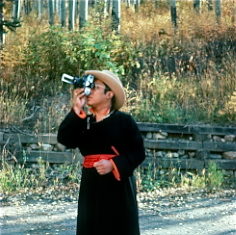by Meg Federico Rob and I had not been to a practice program together, (let alone on a vacation) since our first child was born and he’s 28 years old now. So, it was a bit of a commitment to drive the fifteen hours to a group retreat in Maine, rather than, say, a seaside resort. It’s not what people usually do on vacation. Usually people go someplace with a bar. We were thrilled to discover that the Profound Treasury of Dharma retreat, while without a watering hole, was a New England seaside resort.
Rob and I had not been to a practice program together, (let alone on a vacation) since our first child was born and he’s 28 years old now. So, it was a bit of a commitment to drive the fifteen hours to a group retreat in Maine, rather than, say, a seaside resort. It’s not what people usually do on vacation. Usually people go someplace with a bar. We were thrilled to discover that the Profound Treasury of Dharma retreat, while without a watering hole, was a New England seaside resort.
The Ferry Beach Conference Center retains its turn-of-the century-atmosphere and feels a bit like a New England college campus. Several clapboard buildings, formerly hotels, have been renovated into modern dormitories. Our room had an ocean view. If you long for a tent, there is a campground ringed with pines. The Ferry beach staff serves vegan, gluten free, vegetarian and regular cuisine in a newly built dining hall. They did the dishes, too. No work rota, leaving you free to meditate, contemplate, and to walk on that beach.
The once dusty Ferry Beach music hall, with high ceilings and disco ball, was transformed into an immaculate shrine room through sweat equity and fresh paint. Familiar rows of zabutons were lined up on the hardwood floor. The faces of our teachers, the ones we knew and ones we never met, looked out at us from the shrine, perhaps once regarding their stubborn students—people like us. The atmosphere of the Vidyadhara was everywhere, especially when that out-of-place disco ball turned in the breeze, shooting random light around the room.  Early on, I figured out how to grab my shower during the tea break to avoid the morning bathroom rush. I got up early, before the 6:30 AM sit, and jogged so I wasn’t too fidgety. I was relieved to learn that coffee was available practically 24/7.
Early on, I figured out how to grab my shower during the tea break to avoid the morning bathroom rush. I got up early, before the 6:30 AM sit, and jogged so I wasn’t too fidgety. I was relieved to learn that coffee was available practically 24/7.
Things settled down. Shrine hall etiquette—bowing, gonging, clacking, and drumming came together. The sound of the surf and the wind in the pines mixed with my breath. I gave up mentally crafting what I would tell my co-workers upon return. I stopped worrying about all that. I concentrated instead on the potential lunch menu, because cooking smells wafted over from the dining hall kitchen all morning.
Dzigar Kongtrul Rinpoche stopped by, and shared a few words of advice. He indicated that if you didn’t meet a charismatic and beloved teacher like Chogyam Trungpa you can feel like you missed the boat. “When I hear the stories, I even feel like that myself ,” he said. But the real legacy of the teacher lies in the teachings, like The Profound Treasury of the Ocean of Dharma. Study and practice fulfill a teacher’s true legacy, and make the dharma alive, rather than shrinking to a fond memory shared by a few.
Classes started. The schedule unfolded like a fan. Sitting, breakfast, sitting, discussion groups, sitting, lunch, meetings with meditation instructors, more classes, dinner, sitting, and Acharya Lief’s pithy elucidation of the Vidyadhara’s Mahayana teachings.
There was a big chunk of free time in the afternoons, and I spent mine walking on the long swath of beach with Rob, or drawing, which was my Dharma Art homework. I could have taken a nap, or checked my email. I could have gone to town, but I didn’t want to. Suddenly, I was no longer “on vacation.” We reached that magical point where the beginning and the end of the program recede from view.
Acharya Lief reviewed the Hinayana core teachings, and then leapt into the Mahayana. Tonglen practice is designed to help you make that leap. Initially you rouse compassion, maybe contemplating a loved one afflicted by illness or tragedy, and then add more people until you include everyone ever born. But I’m so stingy with my love that I only got stirred up when I thought of my dear deceased dog. My eyes teared and my nose ran. Other people probably thought I was really feeling all that universal suffering.
Then I forgot the dog because I smelled lunch. I tried to imagine world hunger but could only care about my own. I went back to contemplating the dog and producing impressive tears. I noticed Rob sniffling behind me. During the break, I discovered that most of my friends and my husband also cried about dogs. You have to start somewhere.
One particular night as Acharya Lief took her seat for the talk, the atmosphere was bright, alert to purpose. We sat, a brave battalion of meditators, eager for the next bolt of profundity.
“There is no essence,” said Acharya Lief, and she produced a sock monkey. She waggled the fat mouthed thing at us. “Where’s the sock monkey? Is it in the sock? The felt lips? The silly ears? There’s only the idea of a sock monkey, right?” I wondered if Atisha had a sock monkey. Or like Tilopa, employed a shoe. The Vidyadhara had his peashooter, his fan, his thunderbolt.
When the retreat ended, we packed our suitcases and took our anecdotes with us. The sock monkey is featured, along with others: Mr. Boyce sporting a Sloganator hat, Judi Boyce’s boozeless 60th birthday party, the No Talent Show (Who knew Harry was a Bollywood Star! And that lady who sang, “O Canada.”) But as Dzigar Kongtrul Rinpoche indicated, the legend of the venerable sock monkey is not quite the point. For one thing, no one at the office will be able to understand what you are talking about.
It’s going home and living it: developing that compassion, and getting beyond the dog.
Long time sangha member Meg Federico is the author of Welcome to the Departure Lounge: Adventures in Mothering Mother. She writes humour for The National Post, and her work has appeared in The Globe and Mail, The Shambhala Sun, and Agni Journal (Boston University Press). She also performs commentary for CBC Radio. For several years, Meg wrote a highly successful weekly column “Transitions: Issues in Caregiving” for The Halifax Daily News. For more information, visit megfederico.ca
Reposted from the Chogyam Trungpa Legacy Project

















